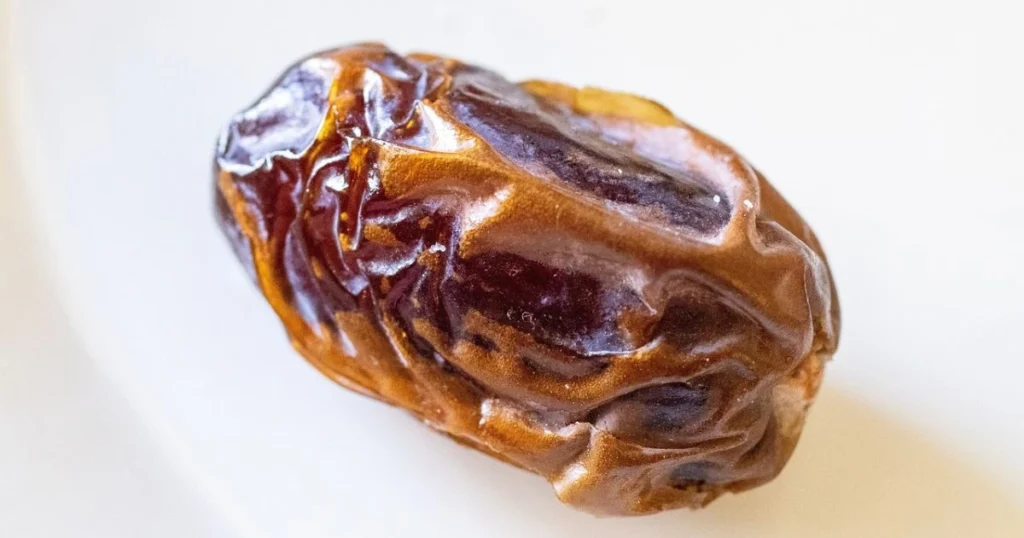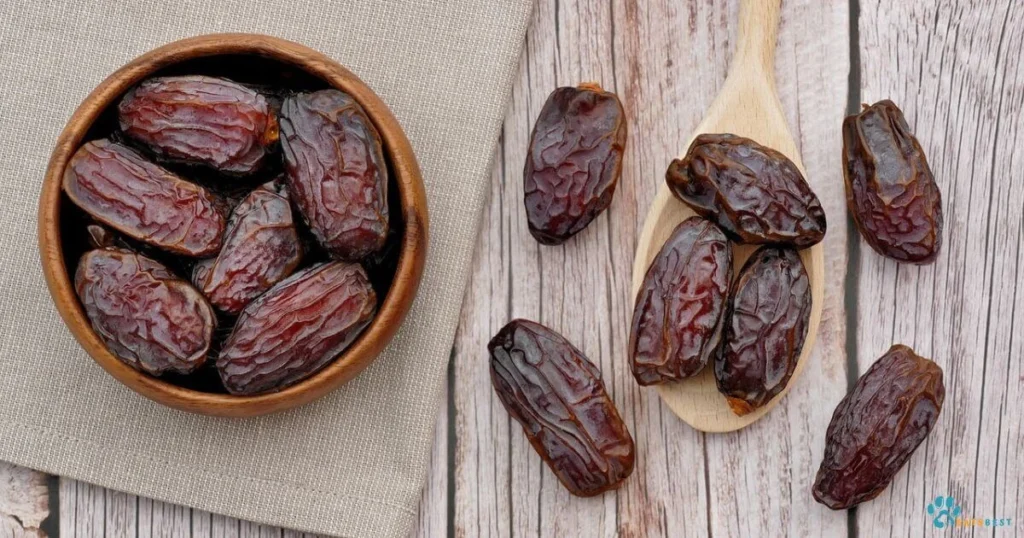Can Dogs Eat Dates? A Complete Guide to Safely Feeding This Sweet Treat
As dog owners, we’re always on the lookout for special treats to spoil our furry friends. Whether it’s a reward for good behavior or just a way to show our love, treats play an important role in our relationship with our canine companions. But when it comes to human foods, especially fruits like dates, many pet parents wonder: can dogs eat dates safely?
Yes, dogs can eat dates in moderation. However, there are important considerations to keep in mind. This article will explore whether dogs can eat dates safely, the potential benefits and risks, and provide guidance on how to offer dates to your dog responsibly.
Table of Contents
What Are Dates?

Dates are sweet, edible fruits that grow on date palm trees (Phoenix dactylifera). They’re known for their chewy texture and natural sweetness, making them a popular snack and natural sweetener in many cuisines around the world.
Common varieties include:
- Medjool dates: Larger, softer, and often considered the “king of dates” due to their caramel-like taste
- Deglet Noor dates: Firmer and drier with a more subtle sweetness
- Zahidi dates: Medium-sized with a light color and crunchy texture
- Barhi dates: Exceptionally sweet with a soft texture
Nutritionally, dates are packed with:
- Fiber
- Potassium
- Magnesium
- Vitamin B6
- Copper
- Iron
- Antioxidants
While these nutrients are beneficial for humans, it’s important to understand how they might affect our canine friends differently.
Nutritional Benefits of Dates (for Humans & Dogs)
Dates offer several nutrients that could potentially benefit dogs when consumed in small amounts:
| Nutrient | Benefit for Dogs |
|---|---|
| Fiber | Supports digestive health and regular bowel movements |
| Potassium | Helps maintain proper muscle and nerve function |
| Vitamins (B6) | Supports brain development and function |
| Antioxidants | May help reduce inflammation and support immune health |
According to veterinary nutritionist Dr. Jennifer Adolphe, “Natural treats like certain fruits can provide additional nutrients and variety to a dog’s diet when offered appropriately.” However, she emphasizes that “treats should make up no more than 10% of a dog’s daily caloric intake.”
Important: Dates should never be considered a primary source of nutrients for dogs. They should only be offered as an occasional treat to supplement a complete and balanced dog food diet.
Are Dates Safe for Dogs? Potential Risks
While dates aren’t toxic to dogs, there are several important risks to consider:
High Sugar Content
Dates are naturally high in sugar, containing approximately 16 grams of sugar per date. This high sugar content poses several risks for dogs:
- Weight gain: Excessive calories from sugary treats can lead to obesity
- Dental problems: Sugar can contribute to tooth decay and gum disease
- Diabetes risk: Regular consumption of high-sugar foods may increase the risk of diabetes in predisposed dogs
Dr. Sarah Wooten, DVM, warns: “Dogs process sugar differently than humans. Even natural sugars can cause spikes in blood glucose levels that aren’t healthy for your pet.”
Pit Hazard
The pit (or stone) inside dates presents a significant choking hazard and potential for intestinal blockage. Date pits are the perfect size to become lodged in a dog’s throat or intestinal tract, especially in smaller breeds.
Always remove the pit completely before offering a date to your dog.
Pesticide Concerns
Non-organic dates may contain pesticide residues that could be harmful to your dog. When possible, opt for organic dates to minimize exposure to potentially harmful chemicals.
Digestive Upset
Some dogs have sensitive digestive systems that may react negatively to new foods, including dates. Possible reactions include:
- Diarrhea
- Vomiting
- Stomach discomfort
- Gas
How to Safely Feed Dates to Your Dog
If you’ve decided to offer your dog a date as an occasional treat, follow these guidelines:
Remove the Pit
This is absolutely critical! Before giving a date to your dog:
- Cut the date in half lengthwise
- Remove the pit completely
- Check for any pit fragments that might remain
Moderation is Key
Dates should be an occasional treat, not a regular part of your dog’s diet. Recommended serving sizes:
- Small dogs (under 20 lbs): ¼ to ½ a date, once or twice a week
- Medium dogs (20-50 lbs): ½ to 1 date, once or twice a week
- Large dogs (over 50 lbs): 1-2 dates per week maximum
Introduce Gradually
When offering dates for the first time:
- Start with a small piece (about ¼ of a date)
- Monitor your dog for 24 hours for any adverse reactions
- If no negative reactions occur, you can continue offering dates occasionally
Cut into Small Pieces
Even after removing the pit, cut the date into smaller, bite-sized pieces to reduce the risk of choking, especially for smaller dogs.
Offer as an Occasional Treat, Not a Staple
Dates should only make up a very small part of your dog’s diet. The majority of their nutrition should come from high-quality dog food formulated for their specific needs.
When NOT to Feed Dates to Your Dog

Certain dogs should avoid dates entirely:
Dogs with Diabetes
Due to their high sugar content, dates can cause dangerous blood sugar spikes in diabetic dogs. Dr. Jerry Klein, Chief Veterinary Officer for the American Kennel Club, advises: “Dogs with diabetes should avoid high-sugar foods like dates entirely, as they can interfere with blood glucose management.”
Dogs with Weight Issues
If your dog is overweight or obese, high-calorie treats like dates can contribute to further weight gain. Focus instead on low-calorie treats or use small pieces of their regular kibble as rewards.
Dogs with Digestive Sensitivities
Some dogs have sensitive stomachs that react poorly to new foods. If your dog has a history of digestive issues, it’s best to avoid dates and stick to treats specifically formulated for sensitive stomachs.
Puppies
Puppies have developing digestive systems that are particularly sensitive to new foods. Wait until your puppy is at least one year old before introducing any human foods, including dates.
Healthier Alternatives to Dates
If you’re looking for dog-friendly fruits and vegetables that offer better nutritional benefits with less sugar, consider these alternatives:
- Blueberries: Rich in antioxidants and lower in sugar than dates
- Carrots: Crunchy, low in calories, and good for dental health
- Apples (without seeds): Provide fiber and vitamins with moderate sugar content
- Cucumber: Hydrating with minimal calories and almost no sugar
- Green beans: Low-calorie and high in fiber
These alternatives offer nutritional benefits without the high sugar content of dates, making them better choices for regular treats.
What to Do If Your Dog Eats a Date Pit
If your dog accidentally consumes a date pit, take these steps:
- Observe your dog closely for signs of distress, such as choking, gagging, drooling, vomiting, abdominal pain, or lethargy
- Do not induce vomiting unless instructed to do so by a veterinarian
- Contact your veterinarian immediately if you notice any concerning symptoms
- In cases of obvious choking, perform the Heimlich maneuver for dogs if you’re trained to do so
Remember: Intestinal blockages can be life-threatening and may require surgical intervention. It’s always better to err on the side of caution and contact your veterinarian if you’re concerned.
FAQ About Dogs and Dates
Can dogs eat dates?
Yes, dogs can eat dates in moderation. They are not toxic but should be given in small amounts.
Can dogs eat Medjool dates?
Yes, dogs can eat Medjool dates in moderation, but they’re particularly high in sugar. Always remove the pit and offer in small amounts.
Are dates safe for dogs to eat?
Dates are safe for dogs in small quantities as long as the pit is removed. However, they should only be given occasionally due to their high sugar content.
How many dates can a dog eat?
Small dogs should have no more than ½ a date per week, medium dogs up to 1 date per week, and large dogs no more than 2 dates per week.
Can dates cause diarrhea in dogs?
Yes, dates can cause digestive upset, including diarrhea, in some dogs due to their high sugar content and fiber. Always introduce dates gradually and in small amounts.
Are date pits poisonous to dogs?
Date pits aren’t toxic, but they pose serious choking and intestinal blockage hazards. Always remove pits before giving dates to your dog.
Can diabetic dogs eat dates?
No, diabetic dogs should not eat dates due to their high sugar content, which can cause dangerous blood sugar spikes.
Conclusion
Dates for dogs can be a safe treat in moderation, but portion control is crucial. While they offer some nutritional benefits, their high sugar content means they should only be given occasionally and in small amounts. Always remember to remove the pit completely and cut the date into small, manageable pieces to prevent choking.
Monitor your dog for any adverse reactions after introducing dates for dogs, and discontinue if you notice any digestive issues or other concerns. For many dogs, there are healthier treat alternatives that provide better nutritional benefits with less sugar
Every dog is different, with unique dietary needs and sensitivities. Before making any significant changes to your dog’s diet, including introducing new treats like dates, it’s always best to consult with your veterinarian for personalized advice.
Have You Given Your Dog Dates?
Have you tried giving dates to your dog? Share your experience in the comments below! And if you found this article helpful, please share it with other dog owners who might be wondering about safe treats for their furry friends.
Looking for more information about dog-friendly foods? Check out our related articles on safe fruits and vegetables for dogs, homemade dog treats, and foods to avoid feeding your canine companion.

